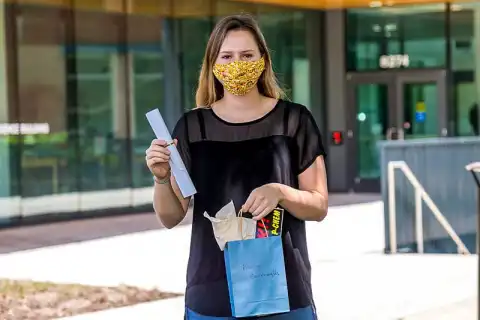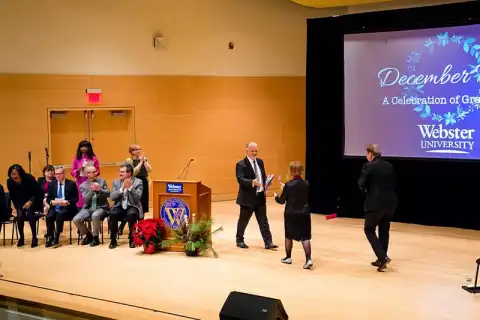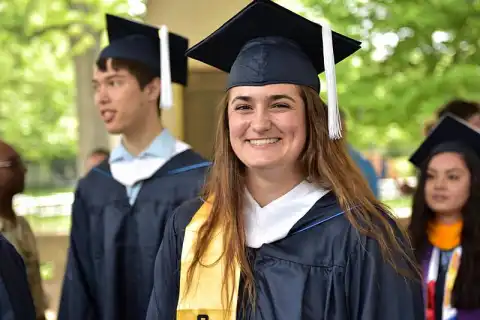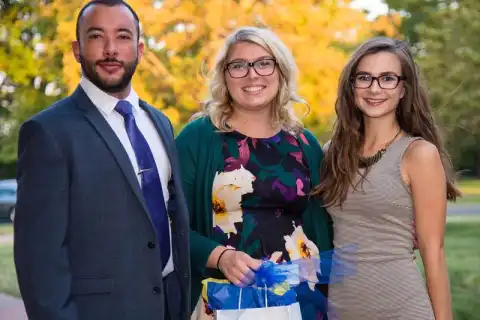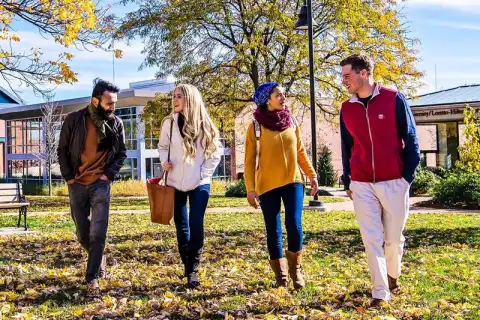Master of Arts - Teaching (Secondary School Education)
- 2 years
- Duration
- 29,450 USD
- Price
- Rolling admission
- Start
- Rolling admission
- Deadline
- Master
- Degree
- Campus
- Format
- St. Louis / USA
- Location
- Webster University
- School
Program description
Graduates of the Master of Arts in Teaching (MAT) program with a focus on secondary education will have learned to use the latest findings in the study of adolescents' cognitive, social, and emotional development to craft effective assessment plans, instructional strategies, curricula, and/or intervention plans.
Also, it's important for students to think critically about how they can help their schools and communities better serve children of all backgrounds by being active advocates for educational equity and inclusion.
Program structure
Main modules
The following 24 hours of courses and 14 hours of field experiences are required to earn the MAT with an emphasis in secondary school education. Students are advised that Missouri initial teacher certification may require more hours than are listed for the MAT degree. Students must consult an advisor in order to obtain a personalized program of study.
Foundations
- Teaching in a Diverse Society
- Inclusive Practices and Methods for Teaching English Learners
- Psychological Foundations of Education
- Digital Pedagogy and Assistive Learning Technologies
Methods
- Classroom and Behavioral Management
- Teaching Reading and Writing in the Content Areas
- Differentiated Reading Assessment and Intervention
Content Methods
- Arts and Humanities Methods or STEM Methods or Elementary Arts and Humanities Methods and Arts and Humanities Methods
Clinical Experiences
Practicum
- Introductory Teaching Practicum
- Practicum: Secondary English or Practicum: Secondary Mathematics or Practicum: Secondary Social Science or Practicum: Secondary Biology or Practicum: Art K-12 or Practicum: French K-12 or Practicum: German K-12 or Practicum: Spanish K-12 or Practicum: Secondary Chemistry
- Practicum Seminar
Apprentice Teaching
- Apprentice Teaching: Secondary English or Apprentice Teaching: Secondary Mathematics or Apprentice Teaching: Secondary Social Science or Apprentice Teaching: Secondary Biology or Apprentice Teaching: Art K-12 or Apprentice Teaching: French K-12 or Apprentice Teaching: German K-12 or Apprentice Teaching: Spanish K-12 or Apprentice Teaching: Secondary Chemistry
- Apprentice Teaching Seminar
Price
Fee for education is 29450.00 USD for international students
This list does not include all fees charged by Webster University.
- Application Fee (non-refundable) - $50
- Graduation Fee (non-refundable) - $130
- Transcript Fee - $20
- Study Abroad (non-refundable) - varies
NOTE: Courses in various academic programs sometimes require expendable supplies or services, and in these cases the student may be billed a class fee for such costs.
Requirements for applicants
- Applicants considered for admission to graduate studies at Webster University must hold an earned baccalaureate degree from an accredited educational institution recognized by Webster University, and meet all program admission standards. Applicants who have a completed baccalaureate degree from a U.S. accredited institution must satisfy program requirements or requisites, including a 2.5 (on a 4.0 scale) minimum cumulative Grade Point Average (GPA) at their baccalaureate degree granting institution for full admission. Students who completed their university education outside the U.S. must have earned an equivalent recognized baccalaureate degree as determined by Webster University. Students who have the necessary academic preparation for admission to accredited/recognized master's-level university programs in their native system of education, providing their academic preparation was at least three years in length, will be considered for admission using Webster University admission criteria. Consideration includes a minimum, cumulative GPA as calculated by Webster University.
- A curriculum vitae (résumé) that documents prior employment and experience or an essay on a topic of the student's choice, such as a special interest, significant experience or notable achievement. Minimum 300 word count in length.
English Proficiency for international student applicants:
Successfully meeting the requirements for one of the following tests within the last two years:
- TOEFL: jBT: 80
- TOEFL: pBT: 550
- IELTS: Academic: 6.0
- Duolingo: 110
- Pearson: 53
- Cambridge Academic English: 169
- Password: 6.0
- GTEC: 1201
- jTEP: 3.7
- SAT's English-based Reading and Writing Score: 450
- ACT composite score: 23
- Completion of at least one year academic of college-level coursework for undergraduate students at a regionally accredited U.S. institution of higher learning within the last three years. It must be academic coursework that is completed; ESL coursework does not qualify.
- Completion of at least one semester of graduate-level courses with grades of B or higher at a regionally accredited U.S. institution of higher learning within the last three years. Coursework must be academic; ESL coursework does not qualify.
- If a student has completed three or more years of study in an English-medium high school or university-level academic program in a country other than ones listed above, he/she may request a waiver.
- Successful completion of the ELS Language Center's English for Academic Purposes or ELS Language Center Level 112 (must have valid ELS 112 Certificate of Completion).
- Successful completion of the University of Central Florida's Center for Multilingual Multicultural Studies (CMMS) Intensive English Program (must have valid completion certificate).
About the university
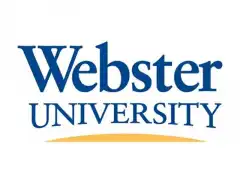
The extraordinary history of Webster University, which was founded in 1915 by the Loretto Sisters with the goal of making higher education more accessible to all, can be traced back to that same commitment to racial equality.
The growing interconnectedness of our world has prompted us to spend the last four decades creating a global network of engaged academics and alumni who work together to create meaningful connections in their local communities and beyond.
Our Core Values
- Students - keeping small classes, personal connections with professors and staff, and a focus on the needs of individual students is one way to ensure a truly global education for every student.
- Learning - for this purpose, we aim to develop educational programs that combine theory and practice; provide an international perspective; encourage creativity; and foster a lifelong desire to learn.
- Diversity and Inclusion - Instilling in students an appreciation for diversity and an understanding of their own and others' values by creating an environment that is accessible to individuals of diverse cultures, ages, and socioeconomic backgrounds.
- Global Citizenship - in order to educate and empower a wide range of people from all walks of life, as well as to protect the environment and strengthen the communities we serve.
Campuses and Locations
No matter where you live or work, our undergraduate and graduate programs are here to help you reach your professional and personal goals. We have campuses in USA, China, Greece, Austria, Switzerland and others.
